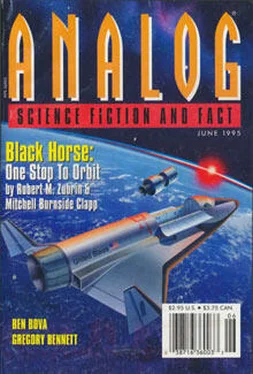Gregory Bennett - Fish Tank
Здесь есть возможность читать онлайн «Gregory Bennett - Fish Tank» весь текст электронной книги совершенно бесплатно (целиком полную версию без сокращений). В некоторых случаях можно слушать аудио, скачать через торрент в формате fb2 и присутствует краткое содержание. Год выпуска: 1995, Издательство: Dell Magazines, Жанр: Фантастика и фэнтези, на английском языке. Описание произведения, (предисловие) а так же отзывы посетителей доступны на портале библиотеки ЛибКат.
- Название:Fish Tank
- Автор:
- Издательство:Dell Magazines
- Жанр:
- Год:1995
- ISBN:нет данных
- Рейтинг книги:3 / 5. Голосов: 1
-
Избранное:Добавить в избранное
- Отзывы:
-
Ваша оценка:
- 60
- 1
- 2
- 3
- 4
- 5
Fish Tank: краткое содержание, описание и аннотация
Предлагаем к чтению аннотацию, описание, краткое содержание или предисловие (зависит от того, что написал сам автор книги «Fish Tank»). Если вы не нашли необходимую информацию о книге — напишите в комментариях, мы постараемся отыскать её.
Fish Tank — читать онлайн бесплатно полную книгу (весь текст) целиком
Ниже представлен текст книги, разбитый по страницам. Система сохранения места последней прочитанной страницы, позволяет с удобством читать онлайн бесплатно книгу «Fish Tank», без необходимости каждый раз заново искать на чём Вы остановились. Поставьте закладку, и сможете в любой момент перейти на страницу, на которой закончили чтение.
Интервал:
Закладка:
She kept up a running narrative as she worked, calling out the number on each sample container and the aquatic life it contained. Jeanette had long developed a habit of talking to herself whenever she was alone in one of her laboratories, but the dull, anechoic environment was getting to her. She tended to shout, as much to reassure herself that there was still a universe beyond her reach as to make sure her helmet microphones would pick up her voice. Occasionally she paused in her work to call for Oscar. Often she thought she could hear that same enigmatic squeak in response, but she began to wonder if it were just her hopeful imagination; octopi do not have voices.
Her venture carried her deeper into the lab until she was working in the volume which had once been the wet lab, the huge salt water aquarium which was OceanLab’s primary purpose. Here the environment was more water than air, huge sloppy spheres with identifiable ripples and currents on their surfaces. She would have to be careful not to get her face stuck inside a globule of liquid.
An undulating wall of water stretched vertically from floor to ceiling, separating the back of the wet lab from the erstwhile dry lab. Wavelets sloshing along the wall reminded her of the low-g swimming pool in Rantoul High Colony. Suddenly the image of the swimming pool was too strong; vertigo spun through her mind as she lost her gravity orientation. She retreated, clinging to a bent piece of framework until she convinced herself the laboratory floor was down.
Lights reflecting off the water wall made it difficult to see what remained of the aquatic life immersed beyond her reach. She didn’t want to abandon her search for Oscar as long as she still had time in the lab, but she had exhausted all the likely places she could look in the aerated volume. If the octopus was still alive, he had to be in the water. She was reluctant to go back for her space suit, but the laborious process of disassembling and reassembling the suit seemed to be the only way she could enter the liquid domain. She was on her way back to the service module to retrieve her suit when she came upon the remnants of the laboratory’s water lock.
“Finally, a bit of luck,” she told herself.
The water lock was a transparent plastic cylinder a meter long, with doors at each end. On every visit to OceanLab, Jeanette had used the water lock to retrieve the little submarines from the aquarium for servicing. The thin, rigid plastic window at one end of the lock was missing, probably popped out in a collision with some other part of the lab when the aquarium wall failed, but the other end was still intact. By inserting the good end into the water, she could use the lock as a sighting device to inspect the regions beyond her reach.
Her makeshift sighting tube allowed her to gather some new varieties of fish. Here, farther from the area which took the brunt of the pressure wave that occurred when the aquarium wall broke, she found very few dead fish. She whooped with joy as she scooped up several tiny flounder with one swipe of a sample container. These flounder were her own discovery, a strain unique to OceanLab—their eyes didn’t migrate to the same side of their bodies as the fish matured. The Seattle Aquarium had paid her a huge bonus for the discovery and even named the fish the Ryan Strain after her, citing her paper where she speculated that in an environment where there is no sea floor, there was no advantage for the terrestrial species’ adaptation to dwelling beneath the sand.
Her joy with recovering samples of the Ryan flounder was quashed when she found Oscar’s pet grouper. Near a construction of fake coral—actually a mineral foam made of the slag left over from smelting Moon soil for its aluminum—the big fish hung dormant in the water. Its distended gills told the story; the grouper must have been killed by decompression. Jeanette puzzled over this. If she were right about how the grouper died, it must have been near the wet lab wall when it broke. But if that were the case, why was the animal now so deep in the water? It should have been floating around the dry lab with all the other dead fish. No matter how the grouper died, though, its death was a tragedy. Oscar had long been fond of the big fish. She thought of it as Oscar’s pet. Hours of video observations had shown that one of his hobbies was feeding the grouper bits of lobster flesh, a delicacy otherwise unavailable to the big fish.
In her ruminations over the demise of Oscar’s pet, she almost overlooked a vital clue to the whereabouts of her cephalopod friend. But a thought nagged at the back of her mind as she continued her search for more specimens. All was not quite right with the gray speckled surface of the fake coral. When the realization hit her, she hurriedly moved her sighting tube back to where she had first spotted the grouper. Indeed, there was a darker vein running through the rock. The surface was smoother in spots. She traced the dark vein, and saw them; molten gold cat’s eyes, staring unblinkingly back at her from inside a tiny rounded hole in the rock just a few centimeters beyond the surface of the water. Oscar!
“Oscar!” she squealed. A thrill of joy coursed through her mind; tears welled up in her eyes. He’s alive! She wiped her eyes on her soggy forearm; it didn’t help much.
Suddenly the dark vein paled and then turned red. It flashed back into the coral, a tentacle being withdrawn. The speckled golden eyes drew deeper into the hole. They stared back at her through narrow vertical slits rimmed in crimson.
“Oscar, don’t you recognize me?” She heard her own voice, shrill with stress and frustration, and realized what was wrong. The octopus was terrified, and had every right to be. Just thinking about the hundreds of suckers clinging to the fake coral told her it would be impossible to extract the animal from his hole by force, not if she wanted to keep him alive. And she desperately wanted to keep him alive.
“Oh, I’ve frightened you.” Now Jeanette lowered her voice, soft and chatty, almost cooing. It was the tone she had always used in talking to Oscar when she visited OceanLab. “It’s me, Oscar, Jeanette. You know me, Oscar. You’ll be safe now. You can come out now, Oscar.” By slowly moving the end of the sighting tube near Oscar’s eyes, she allowed him to get a good look at her face. The octopus tried to draw even farther away, but he was trapped by the size of the hole he had chosen to hide in.
Then, the tip of one tentacle sneaked out. It was a mottled dark gray now. Good; that was the color Oscar took on when he was relaxed. Tentatively the tentacle touched the transparent window of her sighting tube and explored the rim of the canister. A few suckers pasted themselves against the little window, and she felt a little tug on her sighting tube. When the tube moved, the tentacle immediately let go and disappeared into the hole in the rock. There was just a faint ripple of red this time; he wasn’t angry, but his fear showed in the pale gray which enveloped his body.
She kept talking, telling Oscar about her flight to OceanLab and how interesting things were in the laboratory. She didn’t expect him to understand her, but these were the subjects she always talked with him about when she first arrived at the lab. If her tone could match what he was used to, he might calm down and come out of his hiding place.
Again a tentacle snaked out, this time feeling its way along the canister of her sighting tube. Jeanette recoiled with a squeal when a few of the suckers touched her face, and again Oscar snapped back into his hole. Gritting her teeth and swallowing hard to quell her feeling of revulsion, she tried reversing the sighting tube, inviting the octopus to hide in this new, convenient hole. He wouldn’t budge. Perhaps the hole was too large for him to feel comfortably safe; she was amazed that Oscar could interpolate himself into such a tiny aperture. After several minutes of coaxing, he still hadn’t moved. She reluctantly concluded she would have to touch the animal, get him used to her, before he could overcome his fear and release his grip on the rock.
Читать дальшеИнтервал:
Закладка:
Похожие книги на «Fish Tank»
Представляем Вашему вниманию похожие книги на «Fish Tank» списком для выбора. Мы отобрали схожую по названию и смыслу литературу в надежде предоставить читателям больше вариантов отыскать новые, интересные, ещё непрочитанные произведения.
Обсуждение, отзывы о книге «Fish Tank» и просто собственные мнения читателей. Оставьте ваши комментарии, напишите, что Вы думаете о произведении, его смысле или главных героях. Укажите что конкретно понравилось, а что нет, и почему Вы так считаете.












